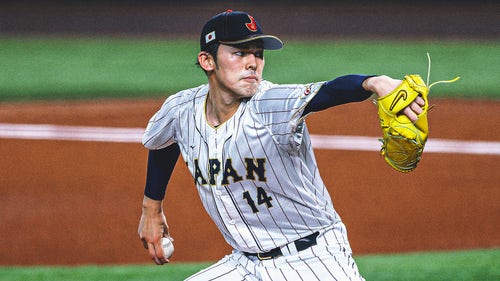
Harper's engine in the shop again, but his time will come

He plays too hard. He doesn't play hard enough. Amid the constant debate surrounding Washington outfielder Bryce Harper, let's not forget that he is 21, the youngest player in the majors. He would be the youngest player on the Nationals' Triple-A club and the youngest on their Double-A club, as well.
Let's also not forget this: Harper, at 6-foot-3, 229 pounds, is not your normal 21-year-old. His agent, Scott Boras, compares Harper's body to a "very big engine" — an engine that isn't easy to steer, manage or otherwise control.
Yes, Harper ripped up his thumb sliding headfirst into third base Friday night, suffering an injury that will sideline him until July. But, please, let's not turn this into another referendum on how the kid plays the game.
Youngsters who see themselves as invincible — Harper, the Dodgers' Yasiel Puig, et al — aren't the only players who slide headfirst. Respected veterans such as Boston's Dustin Pedroia and Philadelphia's Chase Utley hurt themselves doing the exact same thing. The Angels' Mike Trout, the yin to Harper's yang, said he will not abandon the practice because it is something he has always done.
As Harper matures, he will learn how to better harness his engine and protect his body. He also will learn to temper his disappointment when he does not perform well, run through the bag even on weak groundouts to the pitcher, and stay in the clubhouse to celebrate victories with teammates even on nights when he goes 0 for 4.
But overall? People need to relax. No, Harper is not Trout. Heck, Mickey Mantle might not have been Trout. And while the comparisons between Harper and Trout are inevitable — and, for those of us following them, rather fun — the expectations on Harper right now are just too extreme.
Part of that is Harper's own doing — perhaps you've seen his Gatorade commercial and other endorsements. Part of it also is because of his early success, the cover of Sports Illustrated at 16, the National League Rookie of the Year after his age-19 season. Part of it is because of Harper's own ambition — in the words of a teammate, "The bar is always raised, and he wants to conquer it."
One day, he just might reach that potential — Mel Ott, Ty Cobb and Al Kaline were the only players to earn more Wins Above Replacement than Harper before they turned 21, according to Fangraphs. But for now, it would be wrong to view Harper as a hothead, a joker, a villain, a spoiled brat. Those with the Nationals who know him best say that he is a smart, decent kid who will learn as he goes along.
Oh, there will be bumps along the way; Nationals manager Matt Williams had little choice but to remove Harper from a game for failing to run hard on April 19. Just two days before, in a team meeting, Williams had told his players that such conduct was unacceptable. Never mind that Harper was nursing a sore quad, and reportedly battling the flu. He was in the lineup, wasn't he? If Williams had done nothing, treated Harper as a teacher's pet, he would have lost the respect of his clubhouse.
Williams' willingness to discuss Harper's transgression with the media at length was less understandable — the manager already had sent his message, there was no need to humiliate the player further. But Williams, who is managing for the first time, also is learning as he goes. Five days later, when Harper ran slowly and then accelerated in time to beat out a grounder that the Angels' Albert Pujols mishandled at first base, Williams toned down his rhetoric considerably.
"He was safe at first base. That's all I care about," Williams said. "We are not asking him to go 100 percent all the time — as fast as he could possibly go, every single moment. Not everybody does. But what we expect is for him to give us a chance, and he gave us a chance on that play."
No two superstars are alike, OK? Trout plays the game in a breezy, jaunty manner, looking almost happy-go-lucky as he bounds across the field, letting his talent flow. Harper, as we've seen, will pout on occasion, put too much pressure on himself. Ken Griffey Jr. showed some of the same traits at a young age, and in an age of social media and 24-hour sports coverage, Harper is under an even greater microscope today.
Really, the trick once Harper returns will be for him simply to stay on the field — he had gotten off to a slow start coming off knee surgery, but had produced a .950 OPS in his previous 65 plate appearances at the time he injured his thumb. The big engine was purring, all right. Harper just needs to moderate it to the pace of the game, realizing that if he could just make 700 plate appearances in a season, his production would be nothing short of absurd.
It's a fine line, of course, a lot to ask of a 21-year-old. But Williams, a former All-Star third baseman, rightly told MLB Network Radio that he did not want Harper to curb his aggressiveness and possibly diminish his ability. Harper is going to be Harper. Asking him to tone it down would be foolish.
For Harper, it's all about managing that massive engine, learning to steer it, to pull off the gas at the right times. He's not Trout. No one is. But check back in five years, and that engine will be rolling down the highway, forcing nearly everyone to get out of the way.










